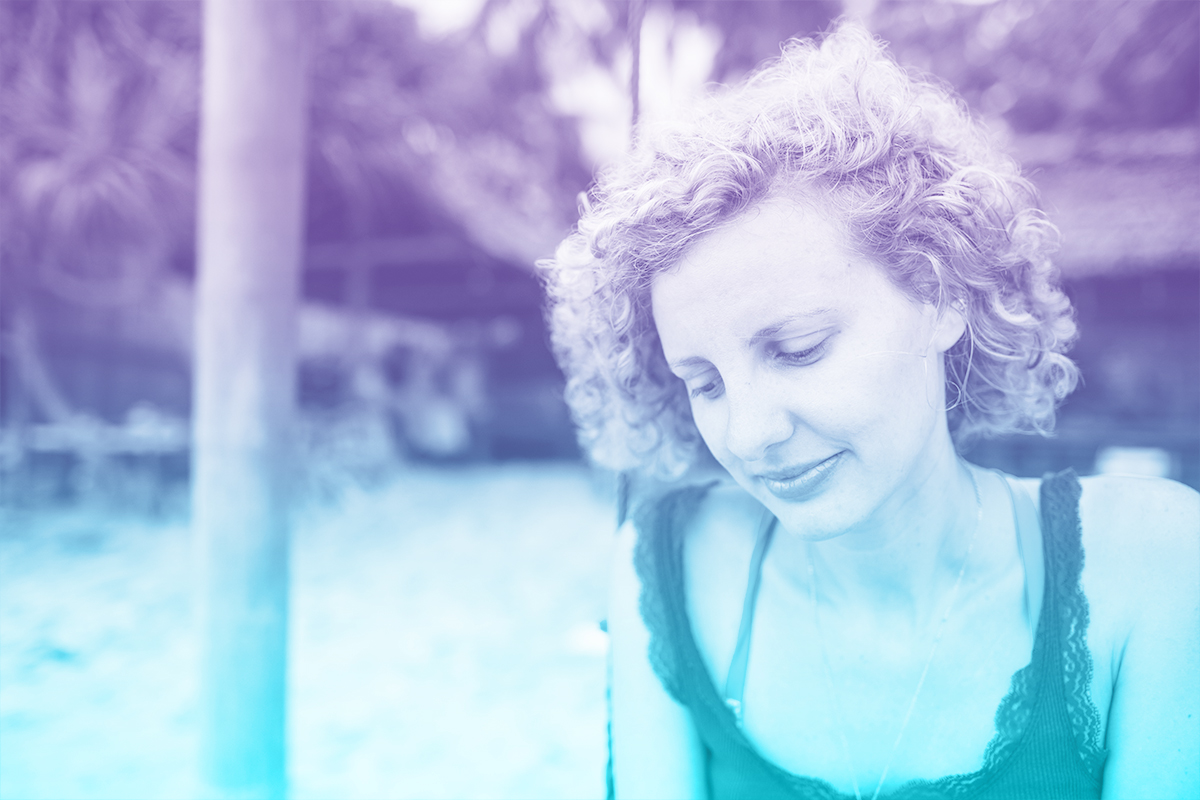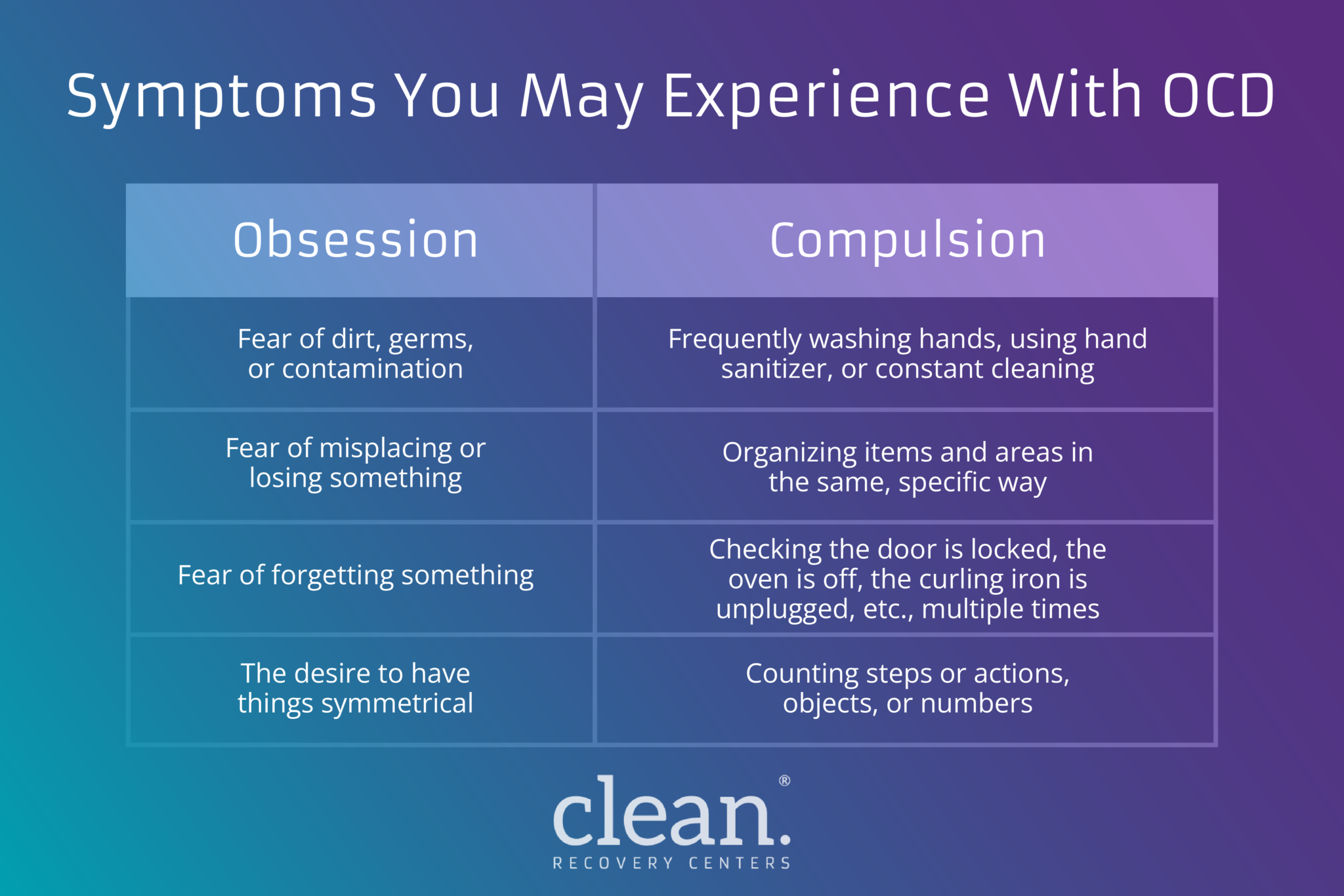Get Clean! Call us today!
OCD Treatment
“Every time I sit down and talk about my OCD, my anxiety, or other traumatic things that have happened in my childhood, I’m always very intentional. I get nervous, but I know that if I feel that way, other people also feel that way about things that have happened in their life.”
– Elyse Myers
It’s easy to joke about mental health when we don’t actually have the condition. Chances are you have had a friend or family member joke “I’m too depressed today,” “I’m just OCD about that stuff,” or “You are giving me anxiety.” These are often said in a light-hearted tone by people who are not actually affected by these conditions. They do not know the daily turmoil these conditions can bring, nor do they understand.

Here at Clean Recovery Centers, we understand how obsessive-compulsive disorder can take over your life. This may lead to substance use and the development of other mental health conditions. Our compassionate team is here to help you heal from OCD, substance use, or both right here on the Suncoast. Our obsessive-compulsive disorder program is fully comprehensive and allows you a safe space to begin healing.
What We Treat: Obsessive-Compulsive Disorder
Obsessive-compulsive disorder (OCD) is a mental health condition classified as an anxiety disorder. It causes a cause-and-effect type relationship between obsessions and compulsions. Intrusive thoughts cause fear and anxiety and lead to compulsive behaviors to stop them. While it is normal to have some obsessive-compulsive tendencies, they are typically short-lived and do not cause problems with daily life. Those with OCD lose time and energy daily which can cause added stress and anxiety.
Clean Recovery Centers has experts who can diagnose and treat OCD as well as other mental health conditions such as substance use disorders.
How We Treat Obsessive-Compulsive Disorder at Clean Recovery Centers
At Clean Recovery Centers, we utilize a unique, three-phase approach to mental health and substance use treatment. Our mental health program begins at phase II – called action – where you will enter our residential II treatment. Extensive therapies we use in the treatment of OCD include rapid-resolution therapy, cognitive behavioral therapy, group, individual, and creative therapy. Our goal is to help you find what works for you specifically, which will create the basis for coping skills in the future. During residential II, you will stay onsite in our supportive housing.
After residential II is complete or when your care team deems fit, you will transition to our partial hospitalization program (PHP). You will continue to receive daily therapies for OCD and work with your care team as you finish phase II.

Phase III is called maintenance and involves outpatient services. Intensive outpatient programming (IOP) and outpatient services take place weekly, and the frequency and length of treatment depend on how you feel and your care team’s counsel. Therapies may include working to perfect your coping skills for life situations and stresses.
Those who are also managing a substance use disorder can receive and follow the mental health treatment path. However, you will start at phase I – preparation – which includes a detox (if necessary) and level I residential treatment. Our team at Clean Recovery Centers can diagnose mental health conditions including OCD at any point in treatment. We can adjust your path to best fit your needs and get you the treatment and support you need.
Understanding OCD: What Causes the Condition?
OCD can stem from different factors, including genetics, environment, and temperament. There is no singular gene or a set of genes that cause OCD, but research has found those with a direct relative (a sibling or parent) are more likely to develop the condition. Environmental factors can include experiencing childhood trauma, abuse, and hardships such as poverty. The person may develop obsessions and compulsions as a way to cope, or they may develop them from seeing others’ behaviors. There have been correlations between children who experience negative emotions as well as depression and anxiety and the development of OCD.
OCD vs OCPD
Obsessive-compulsive disorder can sometimes be confused with obsessive-compulsive personality disorder (OCPD). OCD is an anxiety disorder, meaning the person is typically aware of anxious feelings. OCPD is a personality disorder in which the person does not usually know they have differences in their personality. OCD is characterized by obsessions resulting in compulsions and symptoms can fluctuate throughout life. OCPD has consistent symptoms that can become more frequent over time. It is characterized by a need for perfection and control over the surrounding environment. Both are mental health conditions that benefit from therapies and sometimes medications.
Who OCD Affects
OCD can affect anyone, especially those with a relative who also has it. Symptoms can begin in childhood around preteen age up to early adulthood. Most will have developed the condition before the age of 25. In the United States in 2023, 12.5% of adults aged 18 and over experienced feelings of anxiety, worry, or nervousness. That equates to over 41 million people. Here in Florida, a survey conducted in February 2023 found that 32.3% of residents reported feelings of anxiety and/or depression, rivaling the national average.
Mental health has become one of the most prevalent topics in our society, which is why it is important to have treatment options. In 2021, 23.2% of U.S. adults between the ages of 18 and 44 were in treatment for a mental health condition. OCD is a chronic condition and can be lifelong, showing the need for mental health care. Clean Recovery Centers is proud to provide support and care for those living with OCD and any other mental health conditions.
Symptoms You May Experience With OCD
Obsessive-compulsive disorder is based on the relation between obsessions and the resulting compulsions. The person will experience repeated thoughts or urges that cause anxiety. These obsessions are often unwanted and cause interference in the person’s life. Because of the obsession, a compulsion will follow as a way to “fix” the issue. Let’s take a look at some examples:
Obession
- Fear of dirt, germs, or contamination
- Fear of misplacing or losing something
- Fear of forgetting something
- The desire to have things symmetrical
Compulsion
- Frequently washing hands, using hand sanitizer, or constant cleaning
- Organizing items and areas in the same, specific way
- Checking the door is locked, the oven is off, the curling iron is unplugged, etc., multiple times
- Counting steps or actions, objects, or numbers
Those with OCD experience anxiety and fear during obsessions, but they can also feel fear if a compulsion cannot be completed. They are typically self-aware and understand that their obsessions and compulsions can be excessive. Some with OCD may also have a tic disorder, where their body experiences uncontrolled movement for a sudden, brief moment. Eye blinking and head jerking are examples of motor tics. Tic disorders can also cause vocal tics such as repetitive sniffing or grunting sounds.

How Obsessive-Compulsive Disorder is Diagnosed
Only a medical professional can diagnose OCD, so a doctor’s visit will be required. The doctor will conduct a psychological evaluation of your symptoms, when they began, and how often they occur. They may perform a physical exam to rule out any other conditions that could be contributing to the concerns at hand. Once a diagnosis of OCD is confirmed, they will advise you on treatment options. The medical team at Clean Recovery Centers is able to diagnose and treat all types of mental health conditions, including obsessive-compulsive disorder.
OCD Treatment and Management Options in Tampa, FL
Obsessive-compulsive disorder can make you feel out of place – like no one understands you. Maybe you have tried self-medicating with substances just to feel some relief. Here at Clean Recovery Centers, we know how mental health and substance use can go hand in hand. Our team of dedicated professionals can provide mental health services on their own or as dual-diagnosis treatment with substance use. There is nothing holding you back from getting the help you need – we are here to welcome you in.
If you or someone you love is managing OCD, substance use disorder, or both, we are here to help. Our three-phase approach is unlike any other treatment program and combines therapy with skill-building classes so you can manage your OCD. Call us today at (888) 330-2532 to learn more or get started today.
Get clean. Live clean. Stay clean.
FAQs About Treating OCD
Can OCD be treated without medication?
Medication is not required to treat OCD. Different therapies such as cognitive behavioral therapy have been shown to improve OCD outcomes.
Is there a cure for OCD?
There currently is no cure for OCD.
Can I live a normal life with OCD?
Yes, it is possible to live a normal life with OCD. It will require treatment and possibly medication, but managing the condition is completely possible.
